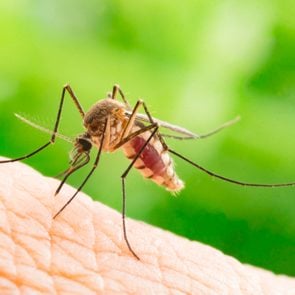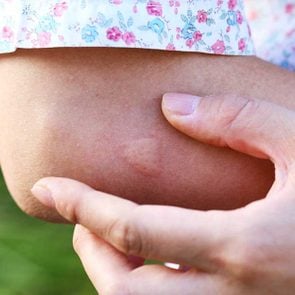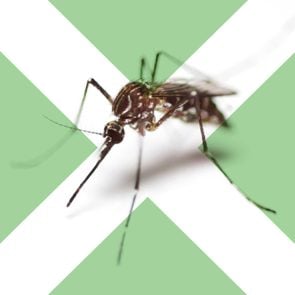Chigger Bites: What They Look Like and How to Prevent and Treat Them
Updated: Jun. 30, 2022
Creepy crawlies to watch out for in the summer include mosquitos and chiggers—tiny mites with a big, itchy bite. Here are chigger bite pictures and symptoms, as well as ways to prevent and treat them.
The summer means more sun, hot weather, and time spent outdoors. This also means more creepy crawlies lurking around. You’re probably familiar with the ants competing for your potato salad at picnics or mosquitos dive-bombing your ears at night. However, they aren’t the only ones that could spoil your summer. Enter: Chiggers—tiny mites with a big bite. Not sure if you’ve seen or been bitten by one? Here’s everything you ever wanted to know (and maybe not wanted to know) about chiggers, including symptoms, pictures, and ways to prevent and treat chigger bites.

On This Page
What are chiggers?
The chigger, also known as redbugs, jiggers, and harvest mites are the parasitic larvae form of a mite in the Trombiculidae family. They are nearly invisible at around 0.15 to 0.3 millimeters and a reddish-orange color. It’s only in this immature “baby” stage when they bite us. After the larvae stage, they enter the predator phase of their life as beneficial arthropods, feeding on insect eggs and other small insects we don’t want.
They must feed to molt and advance to the next stage (nymph) and finally feed and molt again to become a full-fledged adult chigger. “If the chigger was left to feed as it wanted/needed, it would then fall off the host, into the habitat, molt to the nymphal stage and get on with its life. Unfortunately for them, when we scratch or scrub them off in the shower, we dislodge the chigger mite, and it doesn’t end up getting much further in life,” says Jody Green, PhD, an entomologist at the University of Nebraska, Lincoln.
Where do chiggers live?
In the United States, chiggers can be found anywhere but are most common in the Midwest, South, and Southeast. (They can be found around the world, and there are more than 50 different species that bite humans.) They are arachnids, not insects, and are more closely related to spiders and ticks.
Green says the habitat of chiggers tends to be in wild plantings, gardens, pollinator habitat, woods and brush, long grass fields, trail edges, and dense shrubbery. Yet, Green cautions, “chiggers can basically be anywhere.” She was the victim of 16 chigger bites while standing on the grass of a short, manicured lawn at a local school—certainly not the environment chiggers are expected to be.
“There’s really no favorite habitat of chiggers because their presence is spotty, and while a few people may be standing in the same habitat, not everyone will endure the same suffer-fest of chiggers,” says Green. (You should be aware of these 10 sneaky backyard dangers this summer.)
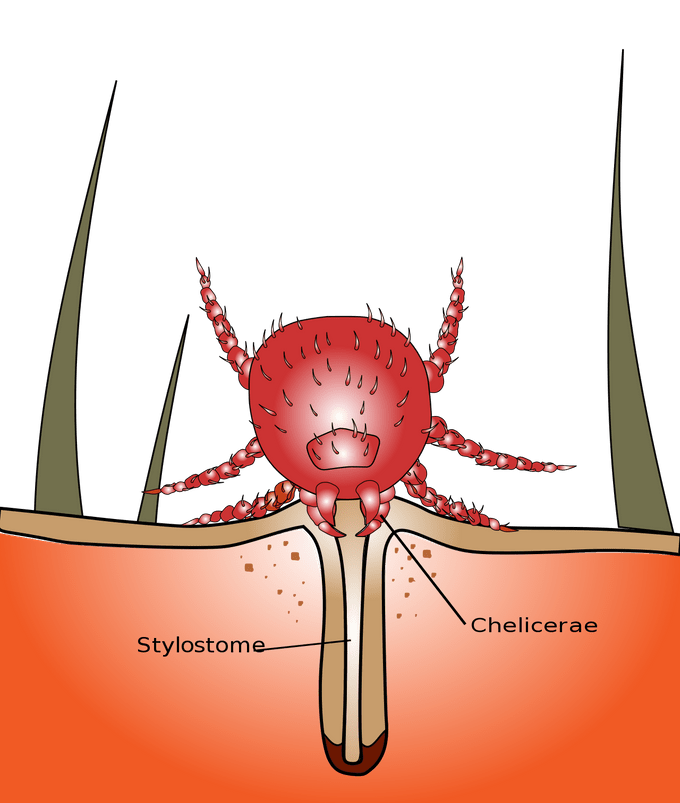
How do chiggers find us?
When humans enter chigger territory, the bugs go on high alert, says Green—they likely notice your shadow and feel the vibrations as you walk. Plus, you release carbon dioxide, which chiggers can pick up on. “They sense our body heat, which they will orient to as a host on which to feed,” Green says. “Chiggers don’t have long, piercing-sucking mouthparts like mosquitoes or ticks, so they bite where they are likely to get a good meal, remain protected, and where it is warm and humid.”
They attach to your clothing, often to areas on the body where clothing is tight—like sock lines, waistlines, underwear, and bra line areas. They tend to bite in a skin depression, like a pore or hair follicle.
“They also will bite in places where the skin is soft and thin like the knee pits, armpits, and again, groin area. Say you’re sitting and your body has skin creases or folds, they will bite in a cluster in that area,” Green says.
Why do chiggers bite us?
It sounds gross, but our skin is their food source (not blood, as you might imagine). Chiggers don’t burrow under our skin and suck our blood as rumored. Chiggers feed uniquely. Unlike a mosquito with a needle-like mouthpart or a tick with a barbed, swordlike mouthpart, chiggers have a short pincher and sharp mouthpiece known as chelicerae. However, a bit like a tick, they do attach to the skin and stay there to feed.
“It starts feeding and does not let go. It secretes enzymes into your skin, breaking it down, and at the same time, creating a channel or tube (called a stylostome) to suck up the liquified skin cells,” says Green.
Chiggers can stay attached to the skin for three or four days, although they are often brushed (or scratched) off the skin before then. (Check out the “harmless” bugs you didn’t know could bite you.)
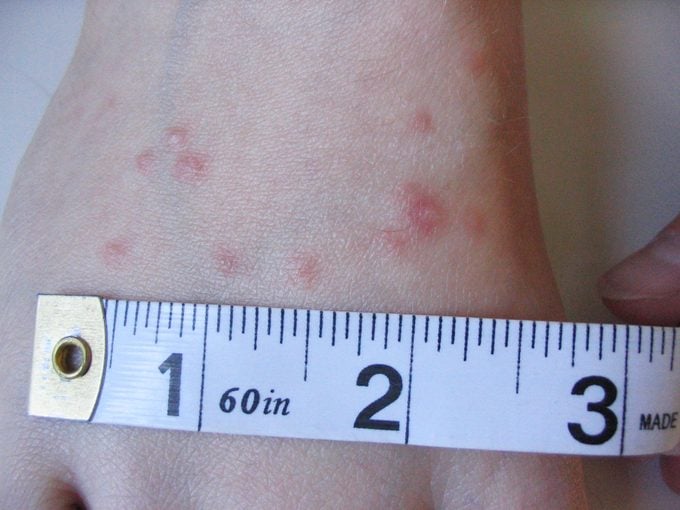
Symptoms of a chigger bite
“Chigger bites often appear as small, red, grouped bumps that commonly occur on the extremities,” Shawn Kwatra, MD, assistant professor of dermatology at the Johns Hopkins University School of Medicine in Baltimore. Other times they can look like pimples or tiny blisters.
You’re likely to see the chigger bites in the areas where your clothes naturally fit tighter, as chiggers the love the warm and moist areas of skins folds, like behind the knee, armpits.
Think—ankles (socks), groin, and waist (underwear bands), and back (bra line areas). Green was wearing shoes, but not socks when she was standing on the lawn, so the chiggers sought out the next tightest spot of thin skin—the underwear and bra area.
Far worse than the unsightly bites is the intense itching. Green describes her chigger bites as, “unbelievable, intense itching in all the wrong places.” (Don’t miss this handy bite guide to identify common bugs bites.)
Why chigger bites are so itchy
You might not even know a chigger bit you or is feeding on you, but you’ll definitely notice the fast and furious itching that follows a couple of hours after chiggers start eating. People who have been bitten by chiggers don’t quickly forget the intense itching. “Chiggers are the worst! It was the most intensely insane itching I’ve ever experienced,” recalls Green of her chigger bites from the school lawn.
Why is the itching so severe? “Chigger bites result in intense itching that comes from the allergic reaction to the chigger’s saliva and from the stylostome itself,” Green says.
Your body steps up to fight the itch on your behalf by absorbing the stylostome and growing new skin, but unfortunately, the process takes about a week or two. Green can relate. She had about a week of uncontrollable itching with the bite marks lasting a month. (Be aware of the 8 bug bites that might need medical attention—now.)
What to do if you’ve been in a chigger-infested area
Unfortunately, chiggers aren’t going to abandon their free meal and hop off your clothes or skin once you get inside. If you’ve been in an area where chiggers like to hang out or even if you’re not sure, it’s crucial to take a shower right upon returning home. The itching period is directly proportional to the amount of time the chigger remained attached to your skin.
The stylostome gets deeper the longer the chigger feeds, so get them off ASAP advises Green. Next, “Put your clothing in a clothes dryer on high heat for 30 minutes before wearing them again,” suggests Green. The heat kills the mites.
If your clothes are soiled, wash them right away and dry them for 30 minutes. Don’t let soiled clothes sit in a hamper or laundry basket. Green advises. Be sure to wipe down your shoes inside and out too.

Do chiggers carry diseases?
Chiggers in the United States are not thought to transfer any diseases. However, in some parts of the world, they can transfer a type of bacteria called Orientia tsutsugamushi, which can cause scrub typhus. Chiggers in rural Southeast Asia, China, Japan, Indonesia, India, and northern Australia, may carry the bacteria, according to the Centers for Disease Control and Prevention.
Scrub typhus can be cured with antibiotics but it can be potentially life-threatening if not treated. Symptoms include fever, headache, and body aches.
How to treat chigger bites
Chiggers digest our skin cells and their calling card is severe itching. Over-the-counter topical steroids and oral antihistamines (like Benadryl or Zyrtec) can help with severe itching, Dr. Kwatra says.
But sometimes you just can’t stop itching, especially at bedtime. “Itch from the bites can be intense and also disrupt sleep. Over-the-counter medicine for chiggers include topical steroids and oral antihistamines can sometimes provide relief, but often topical steroids are needed,” he adds.
Infection isn’t common, but sometimes a superficial bacterial infection can occur in the area present as an overlying yellowish discoloration with pus. You may notice some changes in your skin even after the itching subsides.
“Chigger bites may leave post-inflammatory hyperpigmentation in the form of dark spots on the skin at the site of previous bites. These usually fade slowly over several months, and you should apply sunscreen to the area to prevent further pigmentation,” recommends Dr. Kwatra. (Here’s why you shouldn’t scratch a bug bite.)
How to protect yourself from chigger bites
Chiggers are most active from early spring to fall when temperatures are between 70 to 80 degrees—about the same time we love to walk barefoot in the grass or hang out in the yard. First and foremost, avoid the trail edges, tall grass fields, dense shrubbery, and other places (mentioned above) where chiggers are more likely to be.
If you must be in those areas, wear long pants, long sleeves, shoes, or boots to keep chiggers off your skin. yourself. “Do a lot of tucking,” recommends Green. “Tuck your pants into your shoes or boots and tuck your shirt into your pants. I also recommend wearing permethrin-treated clothing and also DEET (25-30 percent) on the skin.” If you’re hanging out in the yard, avoid sitting directly on the grass. Keep the lawn and bushes trimmed.
You can spray a type of insecticide called synthetic pyrethroids (look for bifenthrin as the active ingredient) to help suppress chiggers, but these chemicals can harm/kill beneficial insects and pollinators. “Some yards are quite large, and that can be a lot of pesticide to spray in the environment, so I’d only recommend it if you know there are indeed chiggers in a localized spot,” suggests Green. (Check out these chemical-free bug repellents that actually work.)
Helpful products to ward off chiggers
The same ingredients and strategies that keep ticks, mosquitoes, and other biting insects from feasting on you will also stop chiggers. Here are some effective strategies and products that will keep chiggers from causing you misery—plus, what to do if you do get bit.
- 12 Natural Ways to Keep Bugs at Bay
- This All-Natural Tick Repellent Works, and Here’s Why
- 10 Naturally Derived Tick Repellents that Actually Work
- 7 Trusted Mosquito-Repelling Products You’ll Actually Want to Use
- The Best Way to Treat Every Type of Bug Bite
Additional resources
Want to learn more about chiggers, their bite, their habitat, and how to avoid these pesky arachnids? Here are some government, university, and commercial sources of information.





















